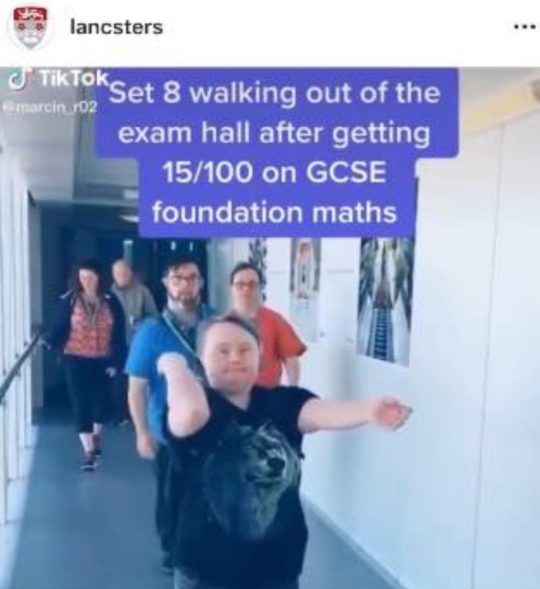
‘Lancsters’ meme page post abelist content
The post has since been removed from the page
On March 3rd of this year the Lancaster University meme page “Lancsters” reposted a TikTok to their Instagram page which depicted a boy with down syndrome doing a dance.
The original TikTok video was captioned: “Set eight walking out of the exam hall after getting 15/100 on GCSE foundation maths”
When reposting this video on their Instagram page Lancsters added their own caption which read: “Can relate”.
One anonymous Lancaster student sent a screenshot of this post to The Lancaster Tab adding: “I saw it and I was like, what the hell? That is insanely problematic, and not even slightly funny. It’s ableism. Why is that okay? It’s not even relevant to Lancaster students? And they’ve got the uni logo as their icon? It was offensive, I’m not sure they know what they’re doing.”
The Lancaster Tab approached Lancsters for comment regarding this post which featured disabled children asking them if they would like to provide a statement in response to being accused of ableism.

Lancsters statement reads: “It’s a funny video about the dance and not related to any disability.”
The Instagram page has over 2,000 followers on their account. A majority of these followers are presumably Lancaster students due to the page’s association with the university, and university life in general, as part of their identity. Their profile picture includes the university logo.
The Lancaster Tab reached out to the Students’ Union Disabilities Officers, Gigi and Sarah, for a response to this post: “Unfortunately this type of incident is common at Lancaster University, and every time it happens this is deeply upsetting to students with disabilities.”
“They also highlighted the impact that those who like and share the posts have on perpetuating these stereotypes. “It’s disheartening to see these posts, but even more so to see people like, tag friends, laugh and jokingly comment without anyone standing up for those targeted.”
They went on to provide other examples from Lancaster pages that they considered a cause for concern [pictured below].

They made sure to mention that these instances of ableism are not unique to anonymous posts online.
“There are many more incidents in accommodations, lectures, transport” and so on.
“People with disabilities are forced to live in a world that is not only often inaccessible to them, but is also full of ableism. The problem is that this won’t change until people acknowledge this as a problem and stand up against it. Ableism is often brushed aside, and out of the forms of discrimination it is often the one taken less seriously. To the point that most people will never have heard the term ‘ableism’ at all. And to the point where people use ableist slurs in public comfortably.
“No matter what someone’s intentions are, treating someone as a lesser being automatically hurts them. And always comparing negative things to disabilities, using disability as an insult, or making fun of traits people with disabilities have, that is treating them as less than you. Because otherwise why would it be the negative trait? You can pretend that’s not the reason, or that it is just a joke. But if the mindset did not exist, you wouldn’t find the joke funny. We don’t.”

Gigi and Sarah went on to point out that both situations like those with the Lancsters stem the “inspiration porn” from “the same ableist mindset that those with disabilities are lesser.
“Inspiration porn includes all those videos jocks/cheerleaders asking a student with a disability to prom. It sends a signal that we do not deserve to live life like everyone else, that people assume we would normally not be worthy of these acts. Like it was somehow heartwarming when we get treated like normal humans. While the abled person looking for views is seen as a hero. As if having to treat us with kindness is some sort of burden or sacrifice.
“When those affected bring up how they are hurt from posts like these, people tend brush off their thoughts and feelings as inconsequential. As if people with disabilities were not worthy of the same rights and considerations. As if they should not have a voice, or as if their hurt was nothing other than a bother. It happens over and over again, it hurts us more every time. Until we give up and remain silent. So we don’t have to face the repercussions of simply asking to be seen as human.”

They finished the statement by insuring that they will support all those who are “hurt by instances like these.”
“We will keep fighting, no matter how hard it becomes. We will meet trying to increase awareness around ableism, and keep calling out these instances. Until one day it is taken seriously. We are making university discrimination policies clearer, so that ableism is directly mentioned. We’re sorry that until then you have to keep hurting. We are always here for support, vents or to help you make formal complaints. Please reach out if you need, you are valid and deserve support.”
Related stories recommended by this writer:
‘The university plays lip service to diversity’: Lancs students on the Uni’s BLM response
We spoke to Lancs LGBTQ+ students about what pride month means to them
Lancs Trans students more vulnerable during COVID-19 pandemic









































